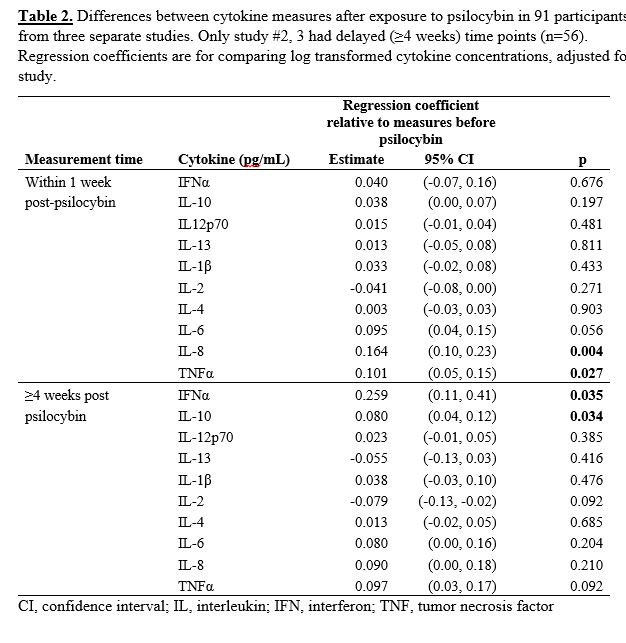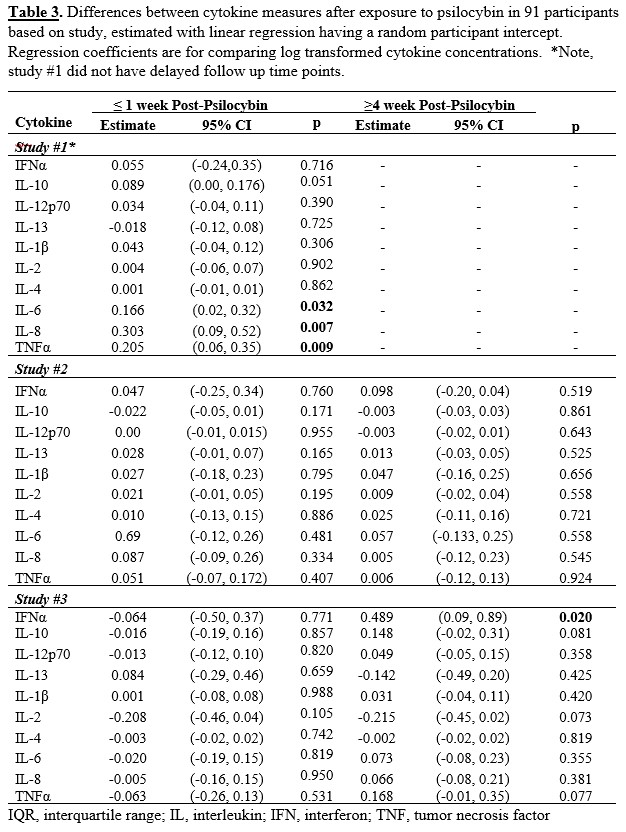Session Information
Session Type: Poster Session A
Session Time: 9:00AM-11:00AM
Background/Purpose: Psilocybin is a psychedelic drug with potential therapeutic effects in patients with mood and substance use disorders. Little is known about its impact on the immune system. In alignment with previous research showcasing psilocybin’s influence on cortical and subcortical brain regions, we hypothesized a connection between these enduring personality changes to alterations in the immune system. Psilocybin, known for its psychoactive properties, has shown potential in increasing positive personality traits and reducing stress and anxiety in previous studies. Our current research considers psilocybin’s potential anti-inflammatory properties, given its role as a serotonin 2A (5-HT2A) receptor agonist. The existing literature suggests that 5-HT2A activation could play a key role in regulating cytokine responses, thereby influencing the immune system.
Methods: Sera from 91 participants were included from our three prior randomized controlled clinical trials (RCTs). Multiplex immunoassay pro-inflammatory cytokine panels (Meso-Scale Discovery) were used to examine the serum from participants in three separate RCTs wherein a range of doses of psilocybin were administered (methods reported previously). Participants represented a range of clinical histories including those with no-known health problems/long-term meditation practice, depression, anxiety, and cancer (various types). Linear mixed models with random effects for each participant were fit to determine relative cytokine levels both before and at various time points after psilocybin administration.
Results: In our linear models, sera collected ≤1-week post-psilocybin revealed increased levels of IL-8 (β=0.164, 95% CI (0.10, 0.23); p=0.004) and TNF-α (β=0.10 (0.05, 0.15); p=0.027). At ≥4-week time points compared to baseline, there was a relative increased level of IL-10 (β=0.08 (0.04, 0.12); p=0.035) and IFNα (β=0.259, 95% CI (0.11, 0.41); p=0.035).
Conclusion: This preliminary study indicates that psilocybin may have impacts on peripheral cytokine concentrations., There was a transient increase in pro-inflammatory cytokine production ≤1-week post-psilocybin followed by delayed anti-inflammatory cytokine production at ≥4 weeks. More broadly, peripheral cytokine production does appear to be altered by psilocybin administration. . Further research is required to understand psilocybin’s broad immunologic impacts on cytokine concentrations in the central nervous system and innate immune signaling. Despite certain limitations, these findings underscore the need to further investigate psilocybin’s influence on the immune system.
To cite this abstract in AMA style:
DiRenzo D, Barrett F, Perin J, Darrah E, Christopher-Stine L, Griffiths R. Impact of Psilocybin on Peripheral Cytokine Production [abstract]. Arthritis Rheumatol. 2023; 75 (suppl 9). https://acrabstracts.org/abstract/impact-of-psilocybin-on-peripheral-cytokine-production/. Accessed .« Back to ACR Convergence 2023
ACR Meeting Abstracts - https://acrabstracts.org/abstract/impact-of-psilocybin-on-peripheral-cytokine-production/



